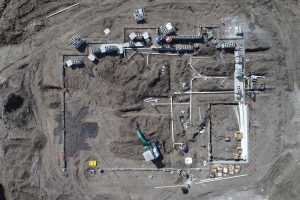
Understanding the Importance of Site Preparation
Site preparation is the foundational phase of any construction project, and it’s a mistake to underestimate its significance. This critical process sets the stage for the entire construction journey, laying the groundwork for a safe, efficient, and successful build.
Ensuring Structural Integrity
The quality of a building’s foundation is directly tied to the condition of the underlying soil and terrain. Thorough site preparation, including soil testing and grading, helps identify potential issues and ensures that the land can support the weight and demands of the proposed structure. By addressing these factors upfront, you can avoid costly and potentially dangerous foundation problems down the line.
Mitigating Environmental Impacts
Site preparation also plays a crucial role in minimizing the environmental impact of construction. From clearing vegetation to managing stormwater runoff, the steps taken during this phase can help protect the surrounding ecosystem and comply with local regulations. By proactively addressing these concerns, you can demonstrate your commitment to sustainable practices and reduce the risk of costly fines or delays.
Streamlining the Construction Process
A well-prepared construction site can significantly streamline the overall building process. By addressing logistical challenges, such as site access and utility connections, in the early stages, you can minimize disruptions, improve efficiency, and keep your project on schedule. This not only benefits the construction team but also helps to manage client expectations and maintain a positive reputation.
The Key Steps in Site Preparation
Preparing a construction site is a multi-faceted process, with several critical steps that must be carefully executed. Let’s explore the essential elements of site preparation and how they contribute to a successful project.
Step 1: Site Surveying
The first and perhaps most crucial step in site preparation is the construction survey. This process involves a thorough assessment of the land, including mapping the boundaries, identifying existing structures or utilities, and determining the optimal placement for the new build. The survey data is then used to create detailed site plans, which serve as the roadmap for the entire construction process.
Step 2: Soil Testing and Analysis
Soil quality is a make-or-break factor in construction, and site preparation must include comprehensive soil testing and analysis. This process involves evaluating the soil’s composition, bearing capacity, and drainage characteristics to ensure the land can support the proposed structure. Soil testing may include percolation tests, geotechnical investigations, and other specialized analyses to identify any potential issues or concerns.
Step 3: Site Clearing and Demolition
Once the site has been surveyed and the soil has been tested, the next step is to clear the land of any existing structures, vegetation, or debris. This may involve the demolition of buildings, the removal of trees and shrubs, and the disposal of any unwanted materials. Careful planning and the use of specialized equipment are essential to ensure this phase is carried out safely and efficiently.
Step 4: Grading and Excavation
With the site cleared, the next step is to grade and excavate the land to prepare it for construction. This may involve moving soil, creating slopes and elevations, and digging trenches for utilities and other infrastructure. Proper grading and excavation are crucial for ensuring adequate drainage, preventing soil erosion, and laying the foundation for a stable and level building site.
Step 5: Soil Compaction and Drainage
After the grading and excavation work is complete, it’s time to focus on soil compaction and drainage. Compacting the soil helps to ensure a stable and supportive foundation, while proper drainage systems are essential for managing stormwater runoff and preventing water-related issues. This step may involve the installation of drainage pipes, retention ponds, or other specialized infrastructure.
Step 6: Utility Connections
The final stage of site preparation involves connecting the construction site to the necessary utilities, such as electricity, water, and sewer systems. This may require coordination with local authorities and the installation of temporary or permanent service lines, ensuring that the site is fully equipped to support the construction process and the future occupants of the building.
Best Practices for Effective Site Preparation
To ensure a seamless and successful site preparation process, it’s essential to follow a set of best practices that have been honed through years of industry experience. Let’s explore some of the key strategies that can help you optimize your site preparation efforts.
Comprehensive Site Assessment
A thorough site assessment is the foundation of effective site preparation. This involves a careful evaluation of the land’s characteristics, including soil composition, topography, drainage patterns, and the presence of any existing structures or utilities. By gathering this comprehensive data, you can make informed decisions and develop a tailored site preparation plan.
Proactive Communication and Collaboration
Successful site preparation requires close coordination and communication between all stakeholders, including construction teams, engineers, local authorities, and the property owner. By fostering open dialogue and collaborating throughout the process, you can identify and address potential issues early on, streamline decision-making, and ensure that all parties are aligned on the project’s goals and requirements.
Adherence to Regulations and Codes
Site preparation must adhere to a complex web of local, state, and federal regulations, as well as industry-specific codes and standards. Familiarizing yourself with these requirements and ensuring compliance throughout the process is crucial to avoid costly delays, fines, or legal issues.
Utilization of Advanced Technology
Modern construction technology has revolutionized the site preparation process, offering a range of tools and solutions to enhance efficiency, accuracy, and safety. From drone-based surveying to GPS-guided excavation equipment, leveraging the latest advancements can help you optimize your site preparation efforts and stay ahead of the competition.
Comprehensive Documentation and Record-Keeping
Meticulous documentation and record-keeping are essential for effective site preparation. By maintaining detailed records of soil tests, site surveys, permit approvals, and other critical documents, you can ensure transparency, improve accountability, and protect yourself in the event of any disputes or legal challenges.
Navigating Common Site Preparation Challenges
While a well-executed site preparation process can set the stage for a successful construction project, there are often challenges and obstacles that must be overcome. Let’s explore some of the most common issues and strategies for addressing them.
Unforeseen Site Conditions
One of the most significant risks in site preparation is the potential for unforeseen site conditions, such as buried debris, unsuitable soil, or unexpected underground utilities. To mitigate this risk, it’s essential to conduct thorough site assessments, engage experienced professionals, and have contingency plans in place to address any surprises that may arise.
Environmental Concerns
Construction projects can have a significant impact on the surrounding environment, and site preparation must address these concerns proactively. This may involve obtaining the necessary permits, implementing erosion control measures, and carefully managing the disposal of any hazardous materials. By prioritizing environmental responsibility, you can not only comply with regulations but also demonstrate your commitment to sustainable practices.
Weather-Related Delays
Adverse weather conditions can wreak havoc on the site preparation process, leading to delays, safety concerns, and additional costs. To mitigate these risks, it’s essential to have a flexible schedule, monitor weather forecasts closely, and have contingency plans in place to address any weather-related disruptions.
Budgetary Constraints
Site preparation can be a significant financial investment, and budgetary constraints can pose a significant challenge. To manage costs effectively, it’s crucial to develop accurate estimates, explore cost-saving strategies, and maintain clear communication with all stakeholders to ensure that the project remains within budget.
The Role of Technology in Site Preparation
The construction industry has witnessed a remarkable technological revolution, and site preparation has been at the forefront of this transformation. Let’s explore how the latest advancements in technology are revolutionizing the way we approach site preparation.
Drone-Based Surveying
Drone technology has revolutionized the site surveying process, allowing for highly accurate and efficient data collection. Drone-based surveys can capture detailed topographical information, identify potential obstacles, and provide a comprehensive overview of the construction site, all while reducing the need for manual, time-consuming field work.
GPS-Guided Equipment
The integration of GPS technology into construction equipment has significantly improved the accuracy and efficiency of grading, excavation, and soil compaction. By leveraging GPS-guided machinery, construction teams can achieve precise elevations, minimize material waste, and streamline the overall site preparation process.
Building Information Modeling (BIM)
Building Information Modeling (BIM) is a powerful tool that integrates 3D modeling, data management, and collaborative workflows to enhance the site preparation process. BIM enables construction teams to visualize the site, identify potential conflicts, and optimize the placement of structures and infrastructure, all before the first shovel hits the ground.
Geospatial Data Analysis
Advancements in geospatial data analysis, including the use of Geographic Information Systems (GIS), have revolutionized the way construction professionals approach site preparation. By leveraging detailed spatial data, teams can identify and mitigate potential risks, optimize site layouts, and make more informed decisions throughout the site preparation phase.
Automated Monitoring and Reporting
The rise of cloud-based construction management platforms has enabled the automation of critical site preparation tasks, such as monitoring soil conditions, tracking equipment usage, and generating comprehensive reports. By streamlining these processes, construction teams can improve transparency, reduce errors, and make data-driven decisions that enhance the overall efficiency of the site preparation phase.
Embracing the Future of Site Preparation
As the construction industry continues to evolve, the role of site preparation is poised to become even more critical. By staying ahead of the curve and embracing the latest advancements in technology, construction professionals can position themselves for long-term success and deliver projects that are not only structurally sound but also environmentally responsible and cost-effective.
Sustainability and Environmental Stewardship
The growing emphasis on sustainability and environmental stewardship is shaping the future of site preparation. Construction teams are increasingly adopting eco-friendly practices, such as the use of recycled materials, the implementation of stormwater management systems, and the preservation of natural habitats. By prioritizing these efforts, they can reduce the environmental impact of construction and demonstrate their commitment to sustainable development.
Integrated Project Delivery (IPD)
Integrated Project Delivery (IPD) is an emerging collaborative approach that brings together all stakeholders, including owners, designers, and contractors, to optimize the construction process from start to finish. This holistic approach to site preparation can help identify and address potential issues early on, improve communication, and foster a shared sense of responsibility for the project’s success.
Artificial Intelligence and Machine Learning
As the construction industry continues to embrace digital transformation, the integration of artificial intelligence (AI) and machine learning (ML) is poised to revolutionize the site preparation process. From predictive analytics to automated decision-making, these technologies can help construction teams optimize site layouts, anticipate and mitigate risks, and streamline the overall construction workflow.
Modular and Prefabricated Construction
The rise of modular and prefabricated construction is also shaping the future of site preparation. By leveraging off-site fabrication techniques, construction teams can reduce the amount of site work required, minimize waste, and accelerate the overall construction timeline. This approach can be particularly beneficial in areas with challenging site conditions or limited access.
Site preparation is the unsung hero of the construction industry, laying the foundation for successful projects and ensuring the safety, efficiency, and longevity of new builds. By understanding the key steps, best practices, and emerging technologies in site preparation, construction professionals can position themselves for long-term success and deliver projects that exceed client expectations.
Contact us (513-617-1401) for more information or a quote
—

About ABS Services
ABS Services provides comprehensive commercial construction services to Greater Cincinnati, Northern Kentucky, and Southeast Indiana. We have the experience, equipment, and the right team to get the job done!
> Learn More
